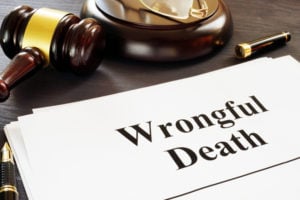
The death of a loved one can cause immeasurable anguish for surviving family members. A wrongful death, meaning a death caused by another’s negligence that could have been prevented, compounds that grief. Though nothing can bring back your loved one, Texas law allows the family of wrongful death victims to collect compensation for their loss from the negligent party. If you have had to suffer the loss of a family member due to the negligence of an individual or company, you should contact the Houston personal injury lawyer at Blass Law.
What Constitutes a Wrongful Death?
Under Texas wrongful death law, an action can be brought for wrongful death if the “wrongful act, neglect, carelessness, unskillfulness, or default” of someone causes the death of another. The action can be brought against one person, a group of people, a corporation, business, business owner and other entities expressly mentioned in the statute.
For a legal consultation with a wrongful death lawyer serving Houston, call 713-225-1900
Who Can File a Wrongful Death Claim?
Laws vary by state as to which surviving relatives can bring an action for wrongful death. In Texas, a wrongful death claim can be brought by:
- The surviving spouse
- The surviving children, even if they are adults
- Surviving parents
- Surviving parents of an unborn child
They can each file a wrongful death action on their own or one person can file on behalf of all of them. If none of the eligible survivors file a lawsuit within three months of the death of their loved one, the personal representative of the deceased person’s estate may file the wrongful death claim. Though some states allow siblings to file a wrongful death lawsuit, Texas does not.
Houston Wrongful Death Attorney 713-225-1900
Examples of Wrongful Death Cases
A wrongful death case can be brought when any type of accident results in death. Some examples include:
- Car accidents: A car accident resulting in death is sadly one of the most common types of wrongful death lawsuits. In 2018, 3,567 people were killed on Texas roadways.
- Motorcycle accidents: In 2017, a total of 501 people were killed on a motorcycle. This statistic includes the motorcycle operator and passengers.
- Drunk Driving Accidents: Texas is one of the deadliest states for drunk driving accidents. Nearly 40 percent of Texas traffic fatalities involve impaired drivers.
- Pedestrian accidents: In 2017, 676 Texas pedestrians were killed. In 2018, the number went down to 597.
- Dog attacks: Every year in Texas, a few people are killed when attacked or bitten by a dog.
- Slip and fall (premises liability) accidents: These commonly occur when businesses, like supermarkets, fail to clean up a spill and someone slips in it and falls. Many deaths result from this type of accident.
- Work-related accidents: A total of 5,147 workers across the country died while on the job in 2017. In 2016, 831 people fell to their death while working. Wrongful death accidents are tragically more for individuals involved in trucking accidents or maritime accidents.
- Medical malpractice: Investigation may be required to determine if medical malpractice was the cause of the death of a loved one.
- Criminal acts, such as homicide or assault and battery: Even if a defendant is criminally charged and acquitted, because of the different burden of proof in a civil case, that person may still be held liable and ordered to pay damages in a wrongful death action. In this case you will need a Houston wrongful death lawyer.
Click to contact our Houston Personal Injury Lawyer today
Proving Negligence in a Wrongful Death Case
Although the damages are different, the elements of proving negligence are the same that would be required if the deceased person had lived and brought a personal injury claim.
- Duty: The defendant owed a duty of care to the decedent. For example, a driver of a car owes a duty of care to other drivers to drive carefully and responsibly.
- Breach: The defendant breaches that duty. The driver of a car veered into the oncoming lane, fell asleep, was drinking alcohol, or texting while driving, are just a few examples of how a duty may be breached.
- Causation: It was the defendant’s breach of his or her duty of care that caused the harm. For example, if a pedestrian crossing a street drops dead of a heart attack, and then, while the pedestrian is still lying in the crosswalk the body is hit by a negligent driver, the negligent driver will likely not be held liable for the death since his or her negligence was not the cause of the death. But, if the pedestrian is crossing in the crosswalk, and the driver is distracted or otherwise fails to yield and hits the pedestrian and kills him or her, the negligence of the driver was the cause of the pedestrian’s death.
- Damages: Plaintiff’s in personal injury cases must prove they suffered damages. In a wrongful death case, damages are presumed since the decedent died.
Complete a Wrongful Death Case Evaluation form now
Damages Available for a Wrongful Death
Under Texas law, the following damages are available for the family of a wrongful death victim:
- Payment for all medical bills incurred by the deceased person that were due to the negligent act that caused the death.
- Loss of household services that would have been provided by the decedent.
- Loss of earning capacity of the deceased person, which includes what the decedent would have earned to support the survivors.
- Burial and funeral expenses.
- Loss of inheritance, which is what the deceased person would have earned if they had lived the normal life expectancy and would have saved and left to their loved ones.
- Loss of care and comfort, companionship, and emotional support and advice.
- Mental anguish and pain and suffering.
- Punitive damages, if the conduct of the one responsible for the death was particularly egregious.
Statute of Limitations for Wrongful Death
Texas law requires a wrongful death action to be brought within two years of the date of the death. There may be exceptions to this rule. For example, if the death was due to medical malpractice, the statute begins to run when it is discovered that the death was due to negligence.
Children who are under the age of 18 at the time of their parent’s death have two years from their 18th birthday to file a wrongful death lawsuit.
Contact a Houston Wrongful Death Lawyer
No amount of money can replace the loss of a beloved family member, but that doesn’t mean that you should suffer additional expenses and financial worry as a result. If your loved one died as the result of negligence on the part of another individual or company, you have a right to recover damages for lost income and mental anguish. Contact the sympathetic, supportive Houston wrongful death attorneys at Blass Law to get your case started. Call (713) 225-1900 or request a case evaluation online.
Call or text 713-225-1900 or complete a Case Evaluation form






